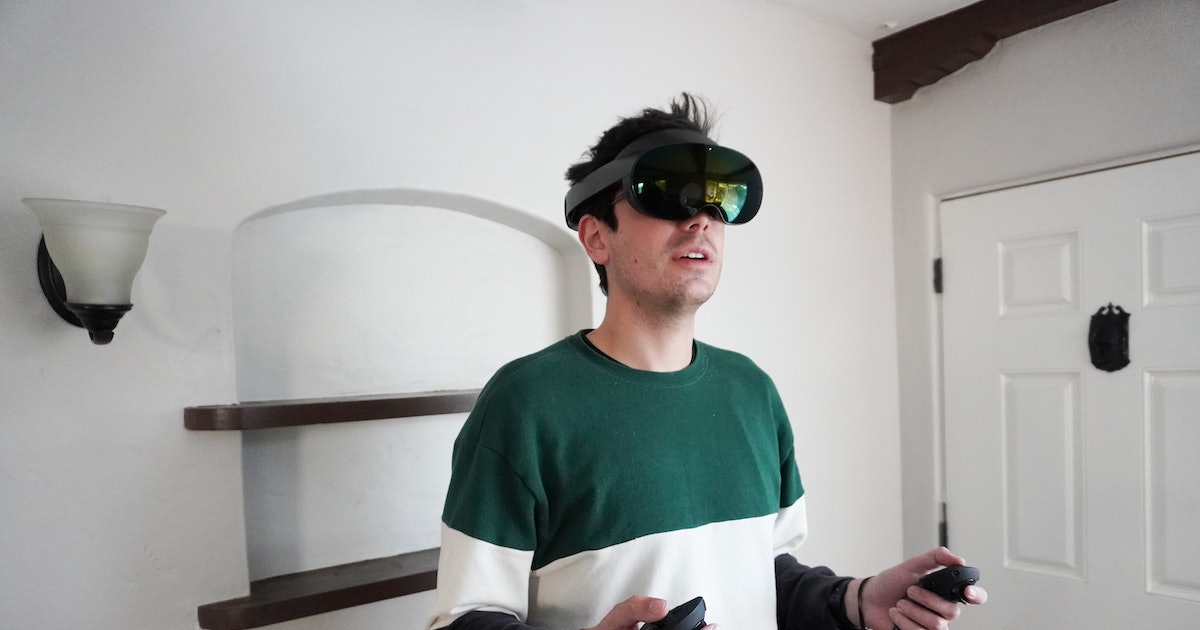
The worst thing about the Quest Pro isn’t its price, it’s the speakers
Most people are going to take one look at the Quest Pro’s eye-watering $1,500 price tag and put their wallets away. I get it — Meta’s “professional” mixed reality headset is really expensive compared to the $400 Quest 2.
But if I’m being honest, the price isn’t that offensive when you think about bleeding-edge technology made for early adopters or enterprise customers. An iPhone 14 Pro Max starts at $1,100 (tops out at $1,600); a Samsung Galaxy Z Fold 4 at $1,800; an M2 MacBook Air at $1,200. The Quest Pro isn’t ready to replace a three-monitor office setup today, but it’s clear Meta’s working toward that goal.
What shocked me more than the price was the quality of the speakers on the Quest Pro. They sound worse than the speakers on the Quest 2 to my ears. At first, I thought maybe it was in my head, but after a month of using the Quest Pro and then comparing it to the Quest 2, I think it warranted this blog post.
Speakers are facing the wrong direction
Sometimes, in the pursuit of making certain features better, other features end up worse than on past implementations. Case in point: the Quest Pro’s speakers. According to Meta, the premium headset comes with an improved audio experience than the Quest 2:
We’ve added greater fidelity to our built-in audio system, with a dynamic bass extension that in most cases can deliver over a half octave deeper bass tones, and crystal clear midrange to make conversations more natural sounding, music sound better, and game play even more exciting. Combined with our spatial audio processing, your ears will transport you right into the VR experience. We’ve also considered those times when you want greater privacy for calls and meetings, by reducing sound leakage by over 10dB compared to Quest 2, making it harder for someone to hear your audio even when standing next to you.
Sound is subjective, and while it’s tough for me to hear any major difference in bass, there’s one thing about the Quest Pro’s speakers we objectively agree on: they fire downwards.
Why the disappointment? Because downward-firing speakers direct sound away from your ears, not into them. On the Quest 2, the speakers are integrated into the rigid side straps, as two slits that — to my ears — are better at creating a spatial audio experience. In comparison, the Quest Pro’s down-facing speakers make audio sound like it’s coming from above — audio sounds farther away at lower volumes. You may disagree, but I’ve found that I had to increase the volume a few ticks than I did on the Quest 2. Louder volume does make the Quest Pro sound better, but when I’m engrossed in a game like Beat Saber or Superhot with lots of physical movements late at night, I’m not trying to wake up the neighbors.
I’ve gone back and forth between the Quest Pro and Quest 2, and always preferred the Quest 2’s speakers. The march of progress implies that new devices should improve on previous ones. But as we’ve seen with all kinds of gadgetry, that’s not always the case. Some people prefer the image processing on older iPhones to the latest iPhone 14 Pro. Super flat butterfly keyboards were not better than the old scissor-switch keyboards. The PS5 Digital Edition can’t play PS4 game discs because it doesn’t have a Blu-ray drive.
Are the Quest Pro’s speakers bad? Not at all; it’s not like they’re unusable. Will most people who buy the $1,500 headset nitpick it? I’ll just say this: if you’re throwing down $1,500, you have the right to nitpick the details.
Most people are going to take one look at the Quest Pro’s eye-watering $1,500 price tag and put their wallets away. I get it — Meta’s “professional” mixed reality headset is really expensive compared to the $400 Quest 2. But if I’m being honest, the price isn’t that offensive when you think about bleeding-edge technology…
Most people are going to take one look at the Quest Pro’s eye-watering $1,500 price tag and put their wallets away. I get it — Meta’s “professional” mixed reality headset is really expensive compared to the $400 Quest 2. But if I’m being honest, the price isn’t that offensive when you think about bleeding-edge technology…